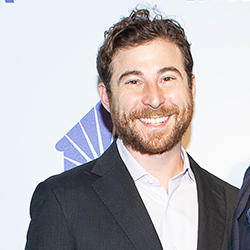In This Section

David Estrakh
Senior Vice President, Express Trade Capital, Inc.
40 Under 40 Category: Business Development
Message from David Estrakh
Biography:
David is senior vice president at Express Trade Capital, Inc., a premier trade finance and logistics provider, which he joined in 2009, while still in law school. In addition to his role as head of business development, his executive responsibilities extend to operations, strategy, marketing, management, legal matters and client relations.
David earned a BA in international relations from John Hopkins University (2004). He received his JD from Benjamin N. Cardozo School of Law (2010) where he was a Dean’s Merit Scholar and member of the Public Law, Policy & Ethics Journal. He’s admitted to the New York State Bar since 2011.
Outside Express, David plays music, writes, performs comedy (often unintentionally), and produces films, two of which are premiering this year (“Honeydew,” screened at Tribeca, and “Silo the Film” screened at KIFF). In his commitment to philanthropy and volunteering, he serves on the Young Leadership Board of Tikva Children’s Homes, and is an active member of several New-York, based community programs and organizations including New York Cares, Central Park Conservancy, City Meals on Wheels, and the NY Public Library.
What is your definition of success?
Fame, fortune, being buff! There are countless definitions of success and limitless avenues in life to be successful, none inherently better or worse. For me, someone who achieves mastery in any field that adds value to nature or humanity is at a high level of success. I feel the same about anyone who develops good relationships – whether with family, friends, colleagues, the larger community, nature, or themselves.
I think we all eventually realize that success can be a trap. Some people chase success, thinking they’ll live happily ever after once they achieve it. The problem with that is, in the long term, you can’t fulfill all internal needs by measuring and attaining external success. Not to mention, most external success is ephemeral and requires maintenance, constant practice and attention, like being buff.
How do you define a good leader?
If you like Gino’s eggplant parmesan from Great Neck, you have the taste of a leader. So that’s definitely where it starts. Sorry, I’m staying in Great Neck lately where I grew up so I’m eating my favorite eggplant parmesan in the world. Seriously, I’ve tried eggplant parm everywhere. Maybe it’s because I ate it for the first time in my teens and there’s some nostalgia baked in it. Anyway, leadership, it’s delicious – and, like good Italian food, it’s varied and all over the place.
I’ve met so many leaders with such different strengths and styles, it’s hard to give a single definition that accounts for all the variations. Instead, here are some traits that seem most common: leaders set the tone and practice what they preach; they listen deeply and communicate effectively; they stay level under pressure and act decisively, while allowing others to offer counsel and participate in the process; they make room for different perspectives and personalities. The leaders I admire most are first and foremost leaders of themselves – they have integrity, good character and self-control. The best leaders are also great coaches who can shape, mold and create new leaders.
What advice do you normally give to the junior talent you mentor?
Keep your head down, do the work, dig in. That’s how you learn. That’s how you grow. Simple. Get the reps in. Quantity becomes quality. Also, it doesn’t hurt to be a good team player and help your colleagues and company shine along the way. Oh, and be nice. (Or you can play the difficult genius card. Warning: you’d better be a genius to play this card.)
How would you encourage young professionals to become more involved in their community or volunteer? How have these activities outside of work helped shape your professional life?
Yes, volunteer! Volunteering helps me put into perspective the relative importance (or unimportance) of professional aggravations and setbacks and focus on the bigger picture.
Among other benefits, for me, participating in worthy causes promotes gratitude, meaning and purpose. Working to fulfill needs outside myself highlights to me how much I take for granted, sometimes even the very air I breathe. It also offers me a healthy dose of ego shrinkage. Ultimately, serving people and good causes roots me in larger communities and plugs me into higher purposes than my own.
In particular, I’d like to give a shout-out to an organization that speaks to me personally – Tikva Children’s Homes (https://www.tikvaodessa.org/). They rescue and care for disadvantaged children from the FSU while rebuilding and revitalizing the decimated Jewish community of Odessa, where my family is from. I’ve been to their homes and their work is truly inspiring.
Professional Development Courses
- Live online classes for ABL and Factoring professionals
- On Demand classes in Appraisals, Factoring, Legal, Workout & Bankruptcy
